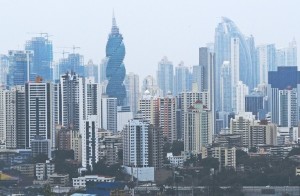A former Brighton reporter has spoken about his role in publishing the “Panama papers” and the benefits of sharing the huge workload involved.
Foreign correspondent Luke Harding, 48, told trade publication Press Gazette that he had spent five months holed up in The Guardian’s “secret cave”.
This was where he and a team of Guardian journalists previously worked on the revelations contained in the American National Security Agency documents leaked by former CIA employee Edward Snowden.
This time round he and his colleagues worked on a huge number of leaked files at the same time as some 400 journalists from 109 news organisations in 80 countries.

The project was co-ordinated by the International Consortium of Investigative Journalists after the data from the Panama law firm Mossack Fonseca was leaked to the German newspaper Suddeutsche Zeitung.
Mr Harding, who worked at The Argus from 1991 to 1993 and lived in Montpelier Road, Brighton, told Press Gazette: “I think it’s the way to go. There are diminishing resources (in newspapers) and investigative journalism is very expensive.
“The way to do it is through transnational alliances where you combine your resources with other people.
“Some of the journalists were brilliant data journalists. Other journalists were very good at the financial nitty-gritty. My job in a way was to write it and make it accessible for the lay reader.”
Mr Harding wrote the lead front page story for The Guardian on Monday (4 April) and added: “I have been on the project for about five months. A couple of my colleagues have been doing it for longer.
“The German newspaper Suddeutsche Zeitung which got the stuff has been on it for a year.
“It’s just been an amazing collaboration across time zones and continents where having so many investigative journalists on a single story has had a kind of multiplying effect.
“We have been sharing tips. We have been sharing stuff we have found.

“What’s been amazing about this leak, in contrast to previous leaks, is it has been uploaded in real time. We had an initial data set which was huge. And then it got bigger.
“Every few months another million documents or so would be uploaded. I have never been on a story before where the data set has been growing all the time.
“Some of the questions you couldn’t answer to begin with, you could answer later because you had more data.
“To be honest I was quite surprised it didn’t leak. I mean there were so many people on this story, in so many different places. But it didn’t leak.
“We had a deadline in the UK which was 7pm on Sunday for publication. I am quite astonished we crossed the line holding hands but we did.”
Next month Mr Harding returns to his old stomping ground for an appearance at the Brighton Festival – his second in three years.
He will be at the Sallis Benney Theatre on Saturday 7 May for The Litvinenko Inquiry alongside Marina, the widow of the murdered Russian spy Alexander Litvinenko.
Mr Harding, wrote A Very Expensive Poison, his book about the murder, having worked as The Guardian’s Moscow correspondent until he was expelled by the regime of Vladimir Putin.
He has also reported from Delhi and Moscow for The Guardian and covered wars in Afghanistan, Iraq, and Libya as well as writing half a dozen books.








